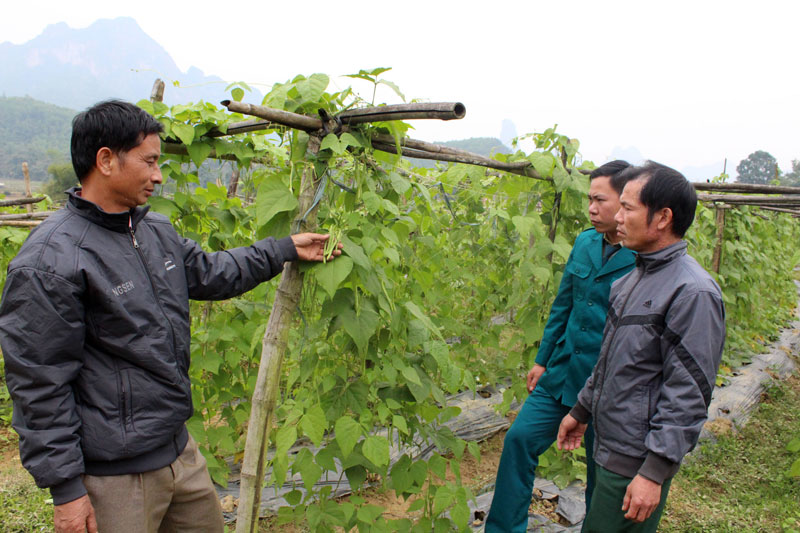
(HBO) – Many officials and Party members have taken the lead in agricultural activities, encouraging a strong and fruitful crop restructuring movement in mountainous Doc Lap commune, Ky Son district of Hoa Binh province.
Nguyen Van Nang (left), head of Noi hamlet in Doc Lap commune
(Ky Son district), directly instructs local farmers how to cultivate vegetables
according to clean production standards in the fields.
Tran Dai Nghi, a resident in Noi hamlet, said
his family used to have 2,000 sq.m of rice farming land which was ineffective.
Complying with the resolution of the hamlet’s Party cell and with the guidance
of local officials and Party members, his family switched from ineffective rice
cultivation to farming other crops. Last year, aside from farming wax gourd,
they also grew an overlapping crop of French bean. Their products were sold
well as they met the market demand.
Apart from about 80 million VND (nearly 3,500
USD) in wax gourd sales, his family also earned more than 10 million VND (440
USD) from French bean, thereby helping to improve their lives.
He added many people in the hamlet have also
successfully converted ineffective rice farming land, thus gaining stable
income and promoting their living standards.
Secretary of the Doc Lap communal Party
Committee Nguyen Hong Binh said crop restructuring has become a strong movement
in not only Noi hamlet but also in all hamlets across the commune. In this
movement, officials and Party members have continually played a key role in
instructing farmers to follow clean production standards right in the fields,
and they have become true "teachers”.
As a result, instead of rice monoculture like in
the past, Doc Lap commune has cultivated new crops and gained initial
encouraging outcomes. Local income has increased by six or seven times from
that generated by rice farming. Wax gourd is an example, he said, noting that
the wax gourd area has been expanded to over 22 hectares across the commune so
far.
The areas of other types of vegetables and beans
have also reached tens of hectares. Notably, local farmers have planted new
crops like lemongrass and galingale with expanding areas, initially generating
economic benefits and improving people’s lives.
Thanks to effective crop restructuring, there
have been many households with income of up to 100 million VND annually in Doc
Lap commune, thereby contributing to poverty reduction, Binh said./.
In Lac Thuy district, communes have been succeeded in promoting their One Commune-One Product (OCOP) products while others are still struggling to position their typical farming products in market. Some communes in the district still fail to have their products met OCOP programme’s requirements, while others have seen their certifications expired.
The inspectorate agency of Hoa Binh province has issued Official Dispatch No. 1090/TTr-PCTN to provincial departments, agencies, localities, business associations, enterprises, and investors regarding measures to improve informal component indexes of the Provincial Competitiveness Index (PCI).
Hoa Binh is taking concrete steps to improve its investment environment, with a strong focus on supporting businesses, settling obstacles for strategic investors, and creating opportunities for robust development in the coming years.
Under the blazing early summer sun, the construction site of Nhuan Trach Industrial Park (IP) in Luong Son district is abuzz with activities from dawn to dusk, a testament to the determination of the investor to meet their construction targets on schedule.



